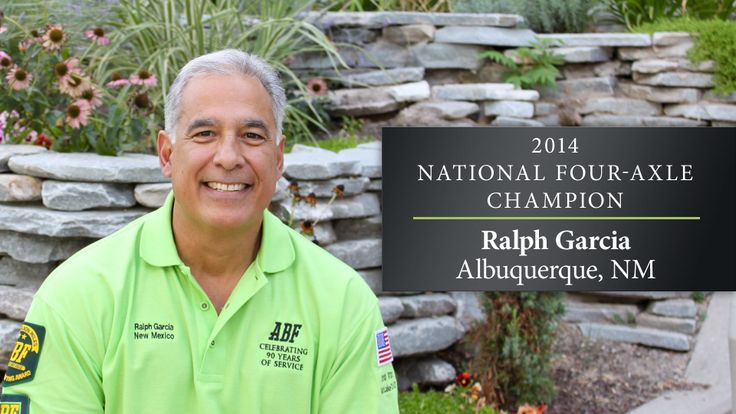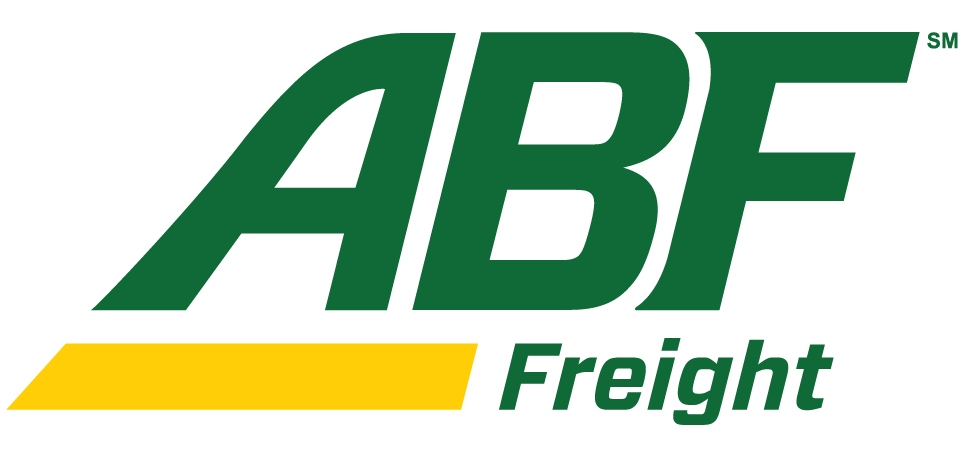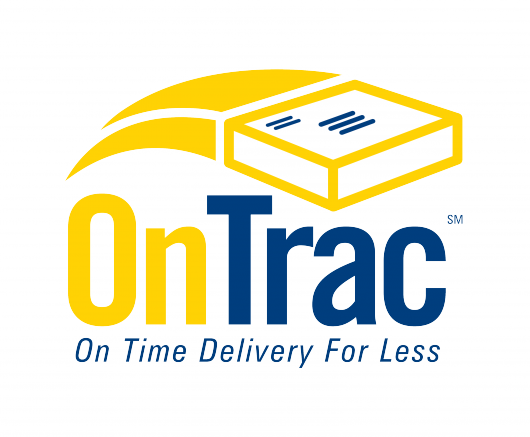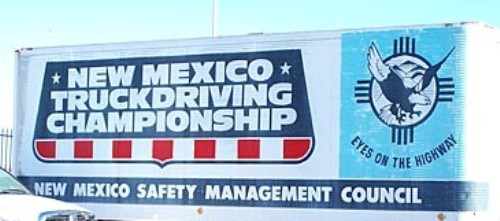| |
|

PR Newswire: Veteran ABF Freight driver, Ralph Garcia of Albuquerque, won an award at the 2014 National Truck Driving Championships August 12-16 in Pittsburgh, Pennsylvania, where Garcia won second place in the sleeper class of the competition hosted by the American Trucking Associations.
"…Just earning the right to compete at this level is an incredible achievement. We are very proud of Ralph, Loren and the entire ABF Freight team of drivers who earned the right to compete by winning state championships and maintaining accident-free driving records," said ABF Freight President and CEO Roy Slagle.
Garcia, of Albuquerque New Mexico, competed in the event for the 17th time. He was the 2013 National Champion in the four-axle class as well as the recipient of the Neill Darmstadter Professional Excellence Award. Garcia's professional accomplishments include serving as an America's Road Team Captain and as a White House Champion of Change. He has also driven accident free for over three million miles and 29 years.
"The National Truck Driving Championships showcase the industry's commitment to safety," said Bill Graves, ATA president and CEO. "I applaud all the competitors for their efforts in making our highways safe, and congratulate the finalists for demonstrating how dedication to safe driving skills can make you a champion."
|
|
|
| |
|

UAW Strikes Back: "Local 42" Now In Tennessee VW Plant - May Be Future Of Labor – From Daily Kos
The Supreme Court has finally stacked the deck enough that the 20th century paradigm of union organizing can no longer succeed. To survive the labor movement must change its tactics and turn recent labor rulings to its advantage. In Tennessee, the UAW appears to be doing just that and today there is a union local, Local 42 representing the workers in the Volkswagen Plant at Chattanooga, TN.
Instead of calling on the National Labor Relations Board (NLRB) to administer an election, the UAW has decided to form a voluntary association called Local 42. At least initially, the group will not collectively bargain on behalf of the plant’s whole workforce, and it will not collect dues. Yet if a majority of the plant’s employees agree to join Local 42, there is a chance that Volkswagen will recognize it as the workers’ exclusive bargaining agent, granting it full union privileges without the need for an election.
A "Voluntary Local" may be the entrée into thousands of large non-union plants and industries though out the country. This is especially true in Republican "Right to Work" states were many companies who would prefer a union model are actively discouraged by conservatives who don't want any virulent strains of prosperity to run amok in the labor class. Volkswagen is an ideal test for this guerrilla tactic. The plant's workers are well aware that they were duped before recent union elections into believing VW would pull back future work if the unionization was successful. After the vote VW made obvious the lies mouthed by Sen. Bob Corker (R) and others. VW went so far as to say that VW would look to states with more favorable union climates for future expansions. VW clearly wants an organized labor presence to work with both for common negotiations and for workplace safety and efficiency issues. That labor/management partnership is a hallmark of the world’s largest auto maker.
It is clear that the activist judiciary entrenched by GW Bush has a passionate hard-on for unions. It may have to do with the political power they used to have (very past tense) and the lobbying leverage they are losing every day.
It certainly has to do with unshackling the "invisible hand of the market" by giving workers the "right to work" at the total will of the employers with no organized protections or negotiations. This assault on labor that began with Ronald Reagan’s firing of the entire PATCO union force in 1981 has since seen practically no real income growth for the American working class while productivity has risen by roughly 65%.
The Anti-Unionists have used the automatic assessment of union fees from entire classes of affiliated workers as their primary axe to chop at collective bargaining. Partially unionizing companies was much more of the norm in the early years of the labor movement and enforced dues are now a legal hazard. The UAW and the SEIU have to pivot to a more flexible stance that can put a union presence into a sector and then let the sector come to it. The success of one "voluntary" union local in one VW plant can put both pressure and incentive on others to follow.
|
|
|
| |
|
|
|
Did you know that U.S. companies can currently receive a tax deduction for certain relocation costs when they move jobs overseas? At a time when the nation’s unemployment rate is still too high, why are we rewarding companies for shipping our jobs out of the country? It doesn’t make any sense!
Senators John Walsh of Montana and Debbie Stabenow of Michigan are trying to right this wrong by introducing the Bring Jobs Home Act. If passed, U.S. companies that move jobs or business operations to America from other countries would receive a tax break, not the other way around. In fact, the tax loophole for companies that ship jobs overseas would be closed. These companies shouldn’t be rewarded any longer.
A vote on the Bring Jobs Home Act is expected in the Senate this week. Please email your Senators today and ask that they “Bring Jobs Home” by supporting this legislation.
|
|
|
|
| |
|

The 2014 ABF “Network Enhancement Initiative” Change of Operation was approved today, June 19th, 2014, by the National Utility Employee Review Committee in Houston Texas.
There will be postings for available transfer opportunities which will be posted from July 3rd through July 10th. There will then be a “pool” phone bid at 9 am Mountain time which will take place on July 11th and the implementation date is planned for July 20th. Click Here for more info
|
|
|
| |
|

As most of you know by now, ABF has filed for a Change of Operation (COO) that will affect the ABQ-120 Dock and Line operations along with 498-Tucumcari Relay. The Union, along with your ABQ-120 Union Stewards, met with Company officials, Thursday June 5th, 2014.
This Change of Operation will create a system that ABF expects will reduce their transit times by 3 days and also in some instances to next day service capabilities which will hopefully create more business for those areas involved.
Click here to Read a brief summary of how the change will affect the flow of freight, Read/Download the entire 2014 ABF Change of Operation Involving Utility Drivers (Article 3 Section7), Read/Download the entire 2014 ABF Change of Operation Involving Road Drivers (Article 8 Section 6), Read/Download the rosters of all terminals involved in the change, and Read/Download Article 8, Section 6 of the NMFA, which deals with rules of COOs including how Moving Expenses are paid, Pool Bidding, 60 day training period for dovetailing into CDL bids and much more.
|
|
|
| |
|

What do Iran and the United States have in common? They both have systemic issues that lead to the rights of workers being violated, according to a report released this month by the International Trade Union Confederation (ITUC).
Despite being touted as a model of liberty and freedom across the globe, the new ITUC document notes the U.S. has a problem when it comes to protecting its workers from corporate greed and indignity. On a ratings scale of “1” to “5” -- with “1” being the best -- America scored a “4” on the ITUC Global Rights Index. That lumps it with such world luminaries as Botswana, the Democratic Republic of Congo, El Salvador, Haiti, Honduras, Indonesia, Myanmar (Burma) and Pakistan.
Maybe even more distressing is this partial list of nations that ranked above the U.S. when it comes to protecting its workers: Albania, Benin, Bulgaria, Burkina Faso, Chad, Ethiopia, Jamaica, Russia, Sri Lanka, Togo, Tunisia, Uganda and Venezuela.
“Countries such as Denmark and Uruguay led the way through their strong labor laws, but perhaps surprisingly, the likes of Greece, the United States and Hong Kong lagged behind,” said Sharan Burrow, the ITUC’s general secretary. “A country’s level of development proved to be a poor indicator of whether it respected basic rights to bargain collectively, strike for decent conditions or simply join a union at all.”
The ITUC used 97 indicators to rank 139 countries. Only Denmark logged a perfect score, the report states. For those that received a “4” rating, like the U.S., it means that, “The government and/or companies are engaged in serious efforts to crush the collective voice of workers putting fundamental rights under continuous threat.”
America’s ranking may come as a shock to some. But for those involved in the labor movement, it is confirmation of on-the-ground observations that have shown this is what workers have been experiencing for years.
The Teamsters are involved in many of those fights to improve the lives of workers. One that has recently gotten some media attention is taking place in the Central Valley of California, where Taylor Farms has taken advantage of hundreds of mostly Latino workers by making them work as temps even though many have been working at their facility in Tracy for years. That allows the produce processor to pay them little and offer no benefits, as well as discard them when they become injured on the job without paying workers compensation.
The war against workers, however, does not end there. The Teamsters are active in standing up for the rights of port truck drivers, school bus employees and solid waste workers, as well as others who are being oppressed. Those involved in the fight see with clear eyes the state of workers in the U.S. Now those in power need to do the same.
|
|
|
| |
|

OnTrac Jobs Protected With Raises, Improved Healthcare Plan
On Sunday, line haul drivers ratified the first-ever Teamster contract at OnTrac, the largest regional package delivery company in America. The drivers are members of Teamsters Local Union 63 in Covina, Calif. and had been negotiating a first contract for more than a year.
The OnTrac line haul drivers in Commerce approved a contract with:
- Protections against unfair discipline;
- Guaranteed raises every year during the life of the 3-year contract;
- Union healthcare plan that covers 100 percent of most major medical expenses and includes dental and vision coverage;
- Paid sick days;
- Increased vacation time for long-term employees;
- Protections against subcontracting out the drivers’ work;
- And improved safety regulations.
“We are happy that these workers will finally have the job protections that they deserve,” said Randy Korgan, Organizing Director of Teamsters Joint Council 42. “OnTrac built its business by outsourcing as much work as possible, and using as many temporary and misclassified employees as possible. We all know that’s a recipe for disaster for workers and their families.”
In February 2014, OnTrac terminated all its line haul drivers in Southern California who did not have union representation, and told them to attempt to find work with OnTrac’s subcontractors. The drivers who had voted for union representation with Teamster Local 63 were protected, however.
“We organized with the Teamsters a year and a half ago to improve our wages, get better healthcare and protect our jobs,” said Eddie Spears, a two-and-a-half-year OnTrac employee who was elected by his coworkers to serve on the union’s bargaining team. “We’ve now got a solid base to build on. Now we have jobs with a future.”
OnTrac’s business model results in substandard wages and working conditions compared to industry competitors. OnTrac delivers to customers via several small contractors who in turn subcontract to couriers who are treated as independent contractors. Couriers are generally responsible for all business costs such as maintenance of vehicles and other equipment. After expenses, couriers often make less than minimum wage.
OnTrac is a privately held company with venture capital from Court Square Capital Partners. OnTrac operates as a subsidiary of Express Messenger Systems, Inc. In 2012, OnTrac earned $286.9 million in revenues and $4.8 million in profits.
|
|
|
| |
|

Companies increasingly are playing an outsized role in U.S. elections. In many cases, they donate money to advocate controversial policies that could antagonize their customers and undermine their businesses. Because so many of these contributions are not disclosed, however, shareholders are left in the dark and unable to evaluate potential conflicts or risks.
Investors are demanding improved corporate disclosures through shareholder resolutions and by urging the Securities and Exchange Commission to adopt new rules. Despite hundreds of thousands of letters from investors urging the agency to take action, it dropped the issue from its list of regulatory priorities earlier this year.
While some companies have done the right thing by making all their political expenditures public, there are still too many publicly listed ones that refuse to raise the veil of secrecy regarding their political giving.
The Teamsters Union invests more than $100 billion in the capital markets through affiliated pension and benefit funds. In addition, our members trade as individuals and as participants in employer-sponsored plans. We are part of a growing chorus of shareholders concerned about political spending.
In addition to tackling governance issues including successes against the dual-class share structure at Swift Transportation and the golden parachutes at Gannett, we have sponsored and supported resolutions calling for improved disclosure and oversight of political expenditures. We also have consistently urged the SEC to adopt meaningful disclosure requirements to provide investors a more accurate accounting of Corporate America’s political giving.
Some argue that groups like so-called super-political action committees, organizations that pool large sums of contributions, already have to disclose donors. That leads to disclosure of corporate spending, or so the argument goes. But the advent of tax-exempt groups trashes this theory, as these entities have increasingly become the vehicles of choice for corporations to influence politics in secret.
Others make the case that social welfare groups already report the identity of donors to the Internal Revenue Service. While that is true, the national tax collector is not allowed to make those names public, and organizations are allowed to edit out the names and addresses of contributors. All that leaves is contribution amounts, which, while helpful, does not shed light on who is giving to a group.
Finally, a few choose to wave the flag and say their donations are covered by free speech protections under the U.S. Constitution. These same people, however, are unconcerned about the extreme disclosure requirements to which unions are subjected.
Under the Labor-Management Reporting and Disclosure Act, unions must report for both themselves and state and local affiliates an itemization of all political spending to any recipient that amounts to an aggregate of $5,000. If unions can do it, so can big business. Besides, requiring disclosure does not inhibit a company’s First Amendment rights; it just adds more transparency and accountability to its shareholders. Even the U.S. Supreme Court in its faulty Citizens United decision said disclosure was an important piece of the puzzle.
The regulatory shortcomings overlooked by the justices helped dark money surge in the 2012 elections to more than $300 million, as reported to the Federal Election Commission. The pharmaceuticals sector is a prime example. In 2008, the industry’s trade association, the Pharmaceutical Research and Manufacturers of America, spent less than $200,000 on federal elections, using only money bundled from transparent individual contributions, mostly from drug company executives. In the following election cycle, after Citizens United, the group spent $10.4 million, nearly all of it from undisclosed corporate sources.
There is a lot at risk for shareholders when companies make questionable donations. Investors in Target learned this the hard way when the retailer’s 2010 contributions to an anti-gay marriage gubernatorial candidate in Minnesota created a backlash against the company by the gay community. Those economic risks should not be underestimated, and investors have a right to know about them.
Why should a shareholder be forced to rely on second-hand disclosure to find out where a company is donating money? There are almost 875,000 Americans who have signed a petition calling on the SEC to develop disclosure rules. The regulator also shouldn’t ignore the string of shareholder resolutions that show just how acrimony over the issue is rising. Growing corporate political donations need to be brought out into the sunshine.
-James P. Hoffa
|
|
|
| |
|

JRH Memorial Scholarship Fund Essay Contest for 2014
The James R. Hoffa Memorial Scholarship Fund has announced this year's Essay Contest topic: "The vast majority of union members make more than the minimum wage. Why should Teamsters care what the minimum wage is?"
For students attending a community college, 4-year institution, or a technical/vocational program, age 23 and younger who are the son, daughter or financial dependent of an eligible Teamster Member Relation (as defined in the application).
For an application, please click on the link below. The deadline for submission of your essay and application is September 30, 2014.
Click Here for Essay Contest Application and Instructions
|
Download:
 jrh2014_essay_application_prelude.uscomplete_0.pdf jrh2014_essay_application_prelude.uscomplete_0.pdf
|
|
| |
|

There were 33 Teamster Drivers that competed in the 2014 Truck Roadeo. Teamsters Local 492, which is a sponsor of the Roadeo, would like to take this time to thank everyone that competed. It takes a lot of time, effort, skill, knowledge and practice to compete in these events, and we all know that Teamster Drivers are the best in the industry; it’s great to be able to show off those skills. We would also like to thank those that volunteered and to all the families that go out to the Roadeo to support these drivers.
Unfortunately, for some reason, some of the family members were told they could not take pictures of the event this year, so we only have one photo so far, and it is from the Awards Ceremony. So if you have pictures you would like to submit please notify us by clicking here.
ABF had 16 Drivers that competed which included Craig Arellano, Gerald Benavidez, Ricky Lucas, Carl Marquez, James Morgan, Ronald Pacheco and Kirk Weis.
1st place in Sleeper, Ralph Garcia
This was Ralph’s 12th win in a row; he also won the National Championship last year.
1st Place in Tanker, Joseph Carrillo
Joseph was rookie of the year last year;
2nd place in the 5 Axle, Charlie Estrada
2nd place in Flatbed, Duane Oldfield
2nd place in Twins, Chad Sullins
3rd place in the 4 axle, Robert Delgado
3rd place in the 5 axle Tito Torres
3rd place in Flatbed Michael Contreras
3rd place in Straight Truck, Donald Woods
ABF won the two categories eligible for in the Fleet Safety Awards which were the 100,000 to 500,000 miles for their city operation and over 5,000,001 miles for the 3rd time in a row for the line haul operation.
ABF also had 2 Drivers of the Month, George Mackey for May and Ralph Garcia for June.
Debbie Archer was selected as the Volunteer of the Year. She has been by Randy Archers side (ABF Line Haul Manger) at the Championships for all 14 years he has been involved. She truly loves making team members and their families feel like they are part of the family. She also helped with the Safety Management Council tents, trailer, etc. Thanks Debbie for all you do! Thanks also to Retiree Robert Aragon for volunteering again this year.
Update July 22, 2014- Brother Duane Oldfield who had placed second in the Flatbed division will now be competing in the Nationals along with Ralph Garcia (Sleeper division) and Joseph Carrillo (Tanker division), all from ABF, as the driver who had finished ahead of him subsequently resigned from his employment which disqualified him from further competition. The National competition will be held in Pittsburgh, PA. the week of August 12th, 2014. Good Luck to the three of you! Represent yourselves, your Union and your Employer with class and professionalism!! Bring back the “Gold”.
Sysco NM had 3 drivers compete including Aaron Clanan who took home “Rookie of the Year”, also Sonny Mariano and Mario Martinez.
UPS-TeamOne (TDI/SCS/Sara Lee Bakeries) had 4 drivers participate; Steve Lopez, Cameron Misner, Jose Seijas, and Brian Thais.
YRC Freight had 10 drivers that competed including Michael McAfee who took home 2nd place in 5 axle sleeper, also James Aragon, Stanley Aragon, Ronald Masawiestewa, Victor Moralez, Charles Perez, Jack Rojas, George Ronquillo, Frank Sandoval, and Joseph Wright. Paul Hunt of YRC received Driver of the month for September.
To view the 2013 Truck Roadeo Article, Click Here
|
|
|
|
